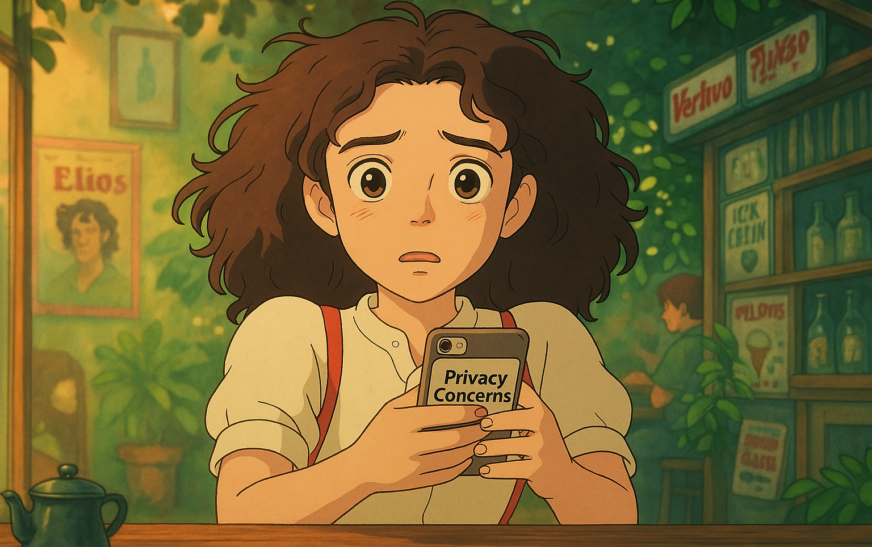The Rise of the Ghibli Art Trend
What Is Ghibli Art?
If you’ve spent time on TikTok or Instagram lately, you’ve probably seen people turning their selfies into dreamy, soft-edged portraits that look straight out of a Studio Ghibli film. These fun and dreamy pictures, called “Ghibli Art,” are inspired by the famous Japanese animation studio, Studio Ghibli. They capture the same warm and magical feeling you see in movies like Spirited Away or My Neighbor Totoro. The art is full of emotion, soft colors, and characters that feel alive and expressive.
But there’s a twist: these aren’t hand-drawn by artists. They’re generated by artificial intelligence. With just a few taps, users can transform their photos into Ghibli-style portraits. They’re undeniably charming but behind the watercolor magic lies a complex question: is this harmless fun, or are we sleepwalking into a digital privacy trap?
The Origins and Explosion of Ghibli Filters
Anime-style portraits made by AI have been around for a while, but the Ghibli-inspired style really took off when smarter AI tools started using face recognition and art-style matching. Apps like Lensa AI, Meitu, and Wonder made it super popular by letting people turn their photos into artwork that looks like it came straight out of a Ghibli movie with soft colors and a cozy, old-school feel.
One big reason this trend is so loved is because Studio Ghibli’s movies don’t just look nice, they make people feel something. They bring out emotions like wonder, childhood memories, and deep thoughts. So when people see themselves as part of that magical world through AI, it feels special like a dream come true.
Lots of people are now sharing their Ghibli-style art on places like Reddit, Instagram, and Etsy. It’s become a huge trend. But like any new tech trend, people are starting to ask questions about how safe it is, who owns the art, and whether it’s okay to use others’ styles like this.
Why Everyone’s Talking About Ghibli Art
Nostalgia Meets Identity
There’s a reason Ghibli filters strike such an emotional chord. For millennials and Gen Zers, Studio Ghibli films weren’t just childhood entertainment—they were transformative, artistic experiences. Seeing oneself rendered in that style taps into a reservoir of comfort, melancholy, and imagination.
This isn’t just a filter—it’s a personal moment of reflection. For many, it feels like reclaiming a piece of childhood or visualizing themselves in a storybook. Its memory, fantasy, and identity all rolled into one beautifully stylized image.
The Role of Social Media
Social media has been instrumental in amplifying this trend. Influencers and celebrities showcasing their Ghibli-inspired avatars turned curiosity into virality. TikTok made it easy to show before-and-after transformations, while hashtags like #GhibliAI, #AnimeFilter, and #GhibliSelfie fueled the algorithmic fire.
The more people joined in, the more normalized it became. And when something becomes normal, scrutiny often fades—along with awareness of the hidden costs.
How Ghibli Filters Actually Work
Behind the Tech: AI & Facial Mapping
These filters don’t just overlay effects, they regenerate your image using AI trained on large datasets of anime and Ghibli-style artwork. Using facial recognition, the AI maps key features, eyes, skin tone, jawline and renders an entirely new version of your face pixel by pixel.
But to do that, the app must deeply analyze your facial structure. This involves collecting biometric data essentially, your digital fingerprint. And once your face enters their servers, you have limited control over where it goes next.
Popular Platforms Offering Ghibli Filters
Apps like Lensa AI and Meitu lead the trend, with others like Artbreeder and Wonder also offering similar effects. Some are free; others require payment. Nearly all require access to your camera and image storage and often upload photos to the cloud, sometimes indefinitely.
Unfortunately, most users accept the terms without reading them. And that’s where the danger begins.
The Creative Side of Ghibli Art
Expression Without Barriers
For many users, these filters offer a unique creative outlet. Without needing artistic skills, anyone can create visually stunning portraits that look like they belong in an animated film. This democratization of visual storytelling is powerful; it invites more people to explore art, identity, and community.
Users share their portraits, create stories around them, and even form communities on Discord and Reddit to exchange ideas or build collaborative projects. Its cosplay meets digital art, and it’s as inspiring as it is playful.
Personalized Fantasy and Emotional Healing
Some users describe the experience as therapeutic. The Ghibli art style is soft, idealized, and gentle; it presents a version of oneself that feels safe and beautiful. For those struggling with self-image, this digital transformation can offer a sense of comfort and confidence.
From cultural representation to fantasy roleplay, people are using these tools not just for fun but to explore identity and belonging in a highly visual, emotionally engaging way.
But Is It Safe?
The Data You’re Giving Away
When you upload a photo, you’re not just getting a stylized image, you’re giving away personal data. Many of these apps require access to your camera, photos, and sometimes even your location or contact list. Your images are often stored on cloud servers some of which operate under lax data privacy laws.
Worse, some companies sell your data to advertisers or data brokers. That adorable Ghibli selfie might have added another layer to a data profile used to target you across the internet.
This isn’t a theoretical risk. It’s a real part of the digital economy.
Terms of Use: What You Might Be Agreeing To
Few users read the terms and conditions. But hidden in the legal fine print are clauses that grant companies rights to:
- Store your photos indefinitely
- Use your image for advertising or AI training
- Sell or share data with third parties
- Retain a “perpetual, royalty-free license” on your likeness
In plain terms: they can use your face forever, for any reason, without paying you or asking permission again. You’re not just giving away a photo, you’re potentially handing over your digital identity.
The Privacy Nightmare in Action
Facial Recognition and Identity Theft Risks
AI apps don’t just replicate your image, they capture detailed biometric data. This same data powers facial recognition in security systems and surveillance tech. If breached or misused, that information can be used for identity theft, unauthorized access, or even deepfake videos.
Hackers have already exploited poorly secured apps to access millions of images. Once your face is in the wrong hands, it could be used in phishing scams, fake profiles, or worse.
Real-World Cases of Misuse
This isn’t just a “what-if” scenario. Real cases include:
- Unauthorized use of AI portraits in ads or merchandise
- User-generated Ghibli images being sold as NFTs without consent
- Likenesses used in fake dating profiles and adult content
These incidents highlight the gap between fast-moving AI innovation and slow-moving privacy legislation. Once your image is part of an AI dataset, control is virtually nonexistent.
Deleting the app won’t delete your data from their servers. It’s a one-way street.
Conclusion: Beauty with a Price Tag
The Ghibli art trend is a perfect storm of nostalgia, creativity, and tech magic. It gives people the power to see themselves through a fantasy lens but that lens comes at a cost.
While the filters are beautiful and emotionally resonant, they also raise pressing concerns about data security, consent, and digital ownership. Before uploading your face to the next viral AI app, it’s worth asking: Is the magic worth the risk?
FAQs
Is using Ghibli filters really dangerous?
Not always, but some apps collect your face data. That can be risky if they don’t keep it safe.
Can AI filters steal my identity?
They don’t steal it directly, but if someone gets your face data, they could use it to pretend to be you.
Are there any safe apps to use for anime-style art?
Yes, but choose apps with good reviews. Don’t give too many permissions, and avoid unknown or shady apps.
What does Studio Ghibli think about this trend?
Studio Ghibli didn’t make or approve these filters. They like making art by hand, not with AI.
How can I protect my digital privacy?
- Use trusted apps
- Don’t share too much info
- Read the app settings
- Delete your photos after use













